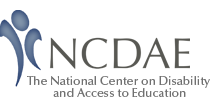Democracy in Action - The Wiki Way
By Sarah Rule
When they agreed to represent the National Center on Disability and Access to Education (NCDAE) on the federal Telecommunications and Electronic and Information Technology Advisory Committee (TEITAC), Jared Smith and Cyndi Rowland had no idea that this role would evolve into development of an accessible tool for citizen participation. Briefly summarized, as a committee of the federal Architectural and Transportation Barriers Compliance Board (Access Board), TEITAC is charged to update standards of Section 508 of the Rehabilitation Act and to review guidelines for telecommunications products according to section 255 of the Telecommunications Act. Public input is essential to make these revisions as effective and useful as possible.
Recognized for his unique technology skills, Jared Smith was asked to represent NCDAE on the committee and to develop a web-based process for public input. Smith designed a website and wiki that permits input from anyone, anytime, anywhere. Using the wiki, interested persons can participate electronically on TEITAC subcommittees of their choice. They can make comments, share documents, and collaborate in the development of guidelines and standards-- free from the barriers of distance, time, and physical, sensory, social or economic limitations.
While it may not seem remarkable to those who are technologically inclined, to others, what this tool represents is entry into the democratic process itself. A public comment period is required whenever federal regulations are changed. Certainly this process has been electronically enabled with tools such as e-mail that permit individuals to submit comments easily, without traveling to the post office or to a public hearing location. This wiki, however, permits citizen involvement throughout the process. Individuals can help develop regulations, contributing diverse perspectives and expertise to the process of drafting them. In the case of TEITAC, it seems particularly fitting that people with disabilities-- who are most affected by the changes in standards and who may differentially experience barriers of travel-- can participate. The experts regarding TEITAC’s charge, people with disabilities, can inform the committee throughout the process. This can only improve the result. In that way, the wiki is a tool to make government by the people feasible—and that is, after all, what democracy is all about.
In another NCDAE article, Jared Smith explains how to provide feedback to TEITAC.
The wiki is a cause for optimism for those of us who bemoan the lack of citizen involvement in the democratic process. I hope readers will help TEITAC broadcast the tool and invite participation in its work. NCDAE will explore use of the tool to address the policy issues Marty Blair has described in his article discussing the accessibility of education in 2007.

